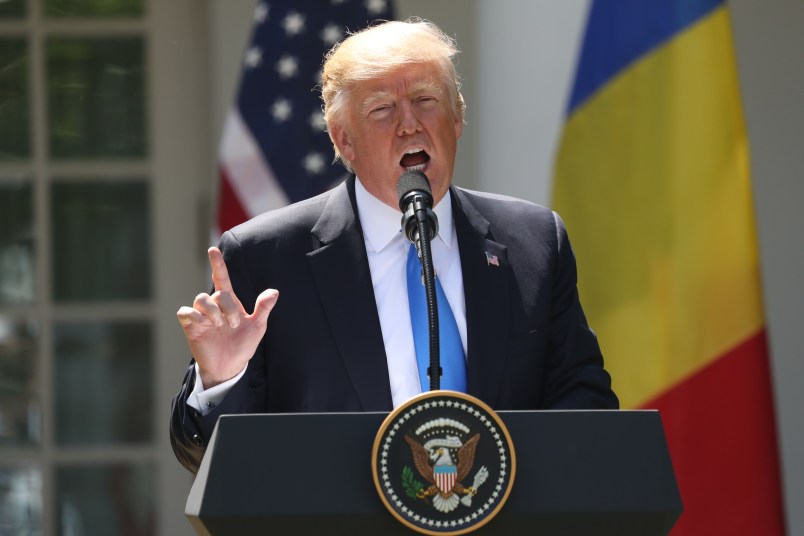A White House not exactly known for its message discipline is fumbling its response to Donald Trump, Jr.’s meeting with a Kremlin-linked lawyer during the 2016 campaign, with new explanations that arise on a near-daily basis become increasingly harder to square with each other.
While maintaining its original defense, that the President himself did not know about the meeting, the Trump administration and the President’s team of outside lawyers have offered up a slew of additional and at times conflicting rationalizations for it. Since the rendezvous was first reported just over a week ago, it has been justified as standard political opposition research; cast as part of a Democratic smear campaign; defended as the naïve undertaking of a 39-year-old “good kid” trying to help his father; and, most recently, blamed on the U.S. Secret Service.
The Trump team’s first response to the June 2016 meeting between Trump Jr., his brother-in-law and White House adviser Jared Kushner, then-campaign manager Paul Manafort and Russian lawyer Natalia Veselnitskaya was to blame the Democrats. Mark Corallo, spokesman for Trump’s legal team, told the New York Times that Veselnitskaya and her fellow guests “misrepresented who they were,” and noted that she had worked with a firm that Democratic operatives retained to produce opposition research on Trump.
The President himself remained quiet, and stayed that way as damaging details about the true purpose of the meeting trickled out. After Trump Jr. got ahead of the Times by releasing a chain of emails via Twitter that revealed a bombshell—he’d attended a meeting expressly billed as an opportunity to obtain damaging information about Hillary Clinton as part of a Russian government effort to help his father’s campaign— Corallo would say only that Trump “was not aware of and did not attend” the meeting.
When Trump finally spoke out in support of his son in the middle of last week, he described him as a political neophyte who just was trying to help the campaign. He praised Trump Jr.’s “transparency” for publishing the entire email chain in which the meeting was arranged, praising him as a “high-quality person” and “good kid.”
“He had a meeting, nothing happened with the meeting,” Trump said.
“Honestly, in a world of politics, most people are going to take the meeting,” he continued. “If somebody called and said…hey, I have really some information on Donald Trump. You’re running against Donald Trump. Can I see you? I men, how many people are not going to take that meeting?”
The President and his defenders have continued to describe the meeting as standard “opposition research,” despite a ream of tweets and articles from opposition researchers and GOP campaign veterans explaining that digging through public records and media appearances for damaging information about an opponent is vastly different than soliciting the help of a hostile foreign government. Even Chris Wray, Trump’s nominee to lead the FBI, said that emails like the one Trump Jr. received should be reported to the bureau.
“Most politicians would have gone to a meeting like the one Don Jr attended in order to get info on an opponent,” Trump insisted in a Monday morning tweet. “That’s politics!”
Trump’s outside counsel got more creative over the weekend with a fresh defense: The Secret Service should have prevented the meeting from ever happening.
“I wonder why the Secret Service, if this was nefarious, why the Secret Service allowed these people in,” attorney Jay Sekulow said in an ABC News interview. “The President had Secret Service protection at that point, and that raised a question with me.”
Putting aside the fact that Trump’s team previously said his son did not know the names of the people he would be meeting, the Secret Service quickly dispatched with that argument by noting that Trump Jr. was not under its protection when he attended the meeting.
“Thus we would not have screened anyone he was meeting with at that time,” spokesman Mason Brayman said in a statement.
In his round of Sunday show hits, Sekulow offered up another talking point popular among White House officials, including Trump’s deputy assistant Sebastian Gorka, that deflects attention to Democrats. Sekulow claimed that “information actually was shared” between “the Ukrainians and the DNC and the Clinton campaign.”
That is an overreaching distillation of a January Politico article that reported Alexandra Chalupa, a former consultant for the Democratic National Committee, conducted independent research on Manafort’s work in Ukraine. Chalupa told Politico that she shared some of what she’d learned with officials at the Ukrainian Embassy in Washington and the DNC.
This throw-everything-at-the-wall-to-see-what-sticks approach may convince some voters or at create a new headline or two to divert some attention from the substance of the meeting. But each fresh rationalization, or excuse, for why Trump Jr. agreed to participate in a Russian government effort to help his father’s campaign is sure to be fodder for congressional and federal investigators probing the exact circumstances that led up to the pivotal meeting at Trump Tower.







Donnie better start doing opposition research on countries that don’t have an extradition treaty with the US.
He can go to any of them to stay, as long as we get Air Force One back. And fumigated.
'ol Putty will take him. He can have the room next to Snowden.
And have a Go To Meeting teleconference with Assholeange
Here is an insightful discussion of Donald Trump: